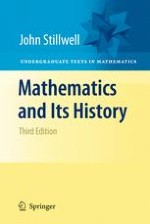2010 | OriginalPaper | Chapter
Algebraic Number Theory
Activate our intelligent search to find suitable subject content or patents.
Select sections of text to find matching patents with Artificial Intelligence. powered by
Select sections of text to find additional relevant content using AI-assisted search. powered by
Another concept of abstract algebra that emerged from the old algebra of equations was that of
ring
, which arose from attempts to find
integer
solutions of equations. The first steps towards the ring concept were taken by Euler (1770b), who discovered equations whose integer solutions are most easily found with the help of irrational or imaginary numbers. Gauss realized that these auxiliary numbers work because they
behave like
integers. In particular, they admit a concept of “prime” for which unique prime factorization holds. In the 1840s and 1850s the idea of “algebraic integers” was pushed further by various mathematicians, and it reached maturity when Dedekind (1871) defined the concept of
algebraic integer
in a
number field of finite degree
. By this time, considerable experience with number fields had been acquired, and Kummer had noticed that such fields do
not
always admit unique prime factorization. Kummer found a way around this difficulty by introducing new objects that he called
ideal numbers
(in analogy with “ideal” objects in geometry, such as points at infinity). Dedekind replaced Kummer’s undefined “ideal numbers” by concrete sets of numbers that he called
ideals
. He was then able to restore unique prime factorization by proving that it holds for ideals. Ring theory as we know it today is largely the result of building a general setting for Dedekind’s theory of ideals. It owes its existence to Emmy Noether, who used to say that “it’s already in Dedekind.”
